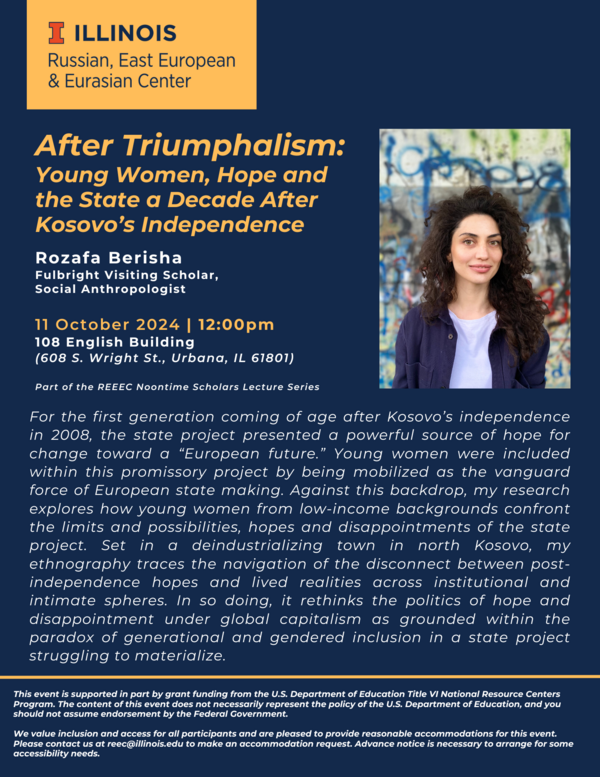
REEEC Noontime Scholars Lecture: Rozafa Berisha, "After Triumphalism: Young Women, Hope and the State a Decade After Kosovo’s Independence"
- Event Type
- Lecture
- Sponsor
- REEEC
- Location
- 108 English Building (608 S. Wright St., Urbana, IL 61801)
- Date
- Oct 11, 2024 12:00 pm
- Speaker
- Rozafa Berisha (Fulbright Visiting Researcher)
- Cost
- Free and open to the public.
- Contact
- REEEC
- reec@illinois.edu
- Views
- 379
- Originating Calendar
- Russian, E. European & Eurasian Center: Speakers
For the first generation coming of age after Kosovo’s independence in 2008, the state project presented a powerful source of hope for change toward a “European future.” Young women were included within this promissory project by being mobilized as the vanguard force of European state making. Against this backdrop, my research explores how young women from low-income backgrounds confront the limits and possibilities, hopes and disappointments of the state project. Set in a deindustrializing town in north Kosovo, my ethnography traces the navigation of the disconnect between post-independence hopes and lived realities across institutional and intimate spheres. In so doing, it rethinks the politics of hope and disappointment under global capitalism as grounded within the paradox of generational and gendered inclusion in a state project struggling to materialize.
Rozafa Berisha is a social anthropologist with an interest in the gendered, social, and affective dimensions of the state. Her research interests lie between anthropologies of the state and geopolitics; youth and gender; hope and affect. She is currently a visiting Fulbright Scholar in the Department of Anthropology at the University of Illinois Urbana-Champaign. Prior to her visiting fellowship at the University of Illinois, she was a visiting scholar at the Institute for East and Southeast European Studies (IOS) in Regensburg (Germany) and Bournemouth University (UK). She currently teaches at the University of Prishtina in Kosovo.